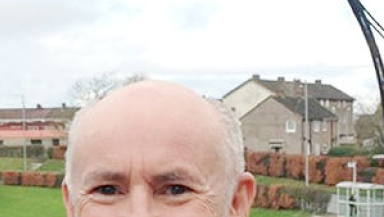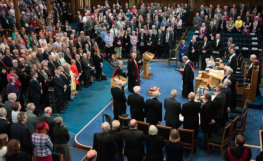
The Church in Scotland is struggling and has experienced years of decline.
A 2013 poll for the Sunday Times and Real Radio Scotland found that only 55 per cent of Scots identified with the Christian faith, while the number who claimed to have no religion had risen over 10 years to 39 per cent.
Support for the Church of Scotland is falling particularly sharply – the same poll showed a 10-point drop from 42 per cent in 2001 to only 32 per cent in 2013 – while the number of Roman Catholics also declined, though by only three points, down to 13 per cent.
Among the ways in which the Roman Catholic Church is meeting the challenges facing it, however, is an intriguing innovation. It's importing priests from India with the specific purpose of evangelisation.
Three priests will serve in the Diocese of Galloway, whose Bishop William Nolan wrote in the diocesan newsletter that they were coming "not to plug gaps or to maintain the current system". Rather, "they are coming because they see Scotland as mission territory".
Bishop Nolan wrote: "They see a country where the faith is tired and the faithful lack the enthusiastic joy of the first Christians – an enthusiasm and joy that we see in the Church in many Third World countries, where the faith is young and alive."
The priests are from an Indian missionary order which is also sending three to the Aberdeen Diocese and another three to the Motherwell Diocese.
Nolan told Christian Today that his Galloway Diocese faced very common problems: fewer priests and fewer committed Catholics, which meant that their time and energy was taken up ministering to the remaining faithful. "There is no impetus to evangelise those outside the Church who are increasingly secular." he said. "The energy in recent years of priests and parishioners has been on managing decline. I hope that missionary priests will help all of us, priests and people, to change our focus to that of spreading the good news to all, particularly to those who have not heard it."
He admitted that the culture in Scotland would be "challenging" due to a hostility toward religion among some. However, he said: "As a missionary order, they exist to bring the faith to where it is not. It is to be expected then that their training will have prepared them for the particular difficulties that missionaries face."
They will spend their first year as assistants in parishes with experienced local clergy, so they can adapt to the local culture. After that period of discernment, they'll be placed where they can be of most use.
Says Nolan: "Scotland has always benefited from foreign priests and religious coming to minister here. What is different now is that these priests and religious are coming from the Third World and from countries which missionaries from Scotland helped evangelise.
"The Church in the Third World is young and vibrant – the Church here lacks the joy of youthfulness. I hope that these missionaries will help the Church in Galloway to rediscover that joy, that youthfulness, that energy."
As in many cases where Christians from developing countries come to minister in Europe, however, the Indian priests' work is likely to be exceptionally challenging.
Eddie Arthur, formerly executive director for Wycliffe Bible Translators and now Director for Strategic Initiatives with Global Connections, told Christian Today: "Whichever direction missionaries go in, there are some problems that they are all likely to face. Adapting to a new language and culture is an issue for anyone trying to minister in a situation very different to their own and I suspect that the weather in Galloway will be every bit as much a challenge to missionaries from India as Indian weather would be to Scots.
"However, for 'reverse' missionaries, there can be an added pressure; no matter how much they have heard about the decline of Christianity in Europe, very little can prepare them for the aggressive secular nature of our society. This can be very dispiriting to incoming missionaries, especially if they have tended to view the UK through rose-tinted spectacles."
Arthur agreed that the influx of missionaries and minsters from other countries could breathe new life into the church in the UK. "One of the features of Church life in the UK has been the rise in black majority churches in our major cities," he said. "What is fascinating is that these churches are attracting increasing numbers of white British people, who are finding a vitality and spirituality that they don't feel they experience in traditional churches.
"Since the day of Pentecost, Christianity has been a multi-ethnic, multi-lingual religion. Cross-fertilisation is in our DNA and missionaries from India to Scotland are just the latest expression of something which has always been a part of the life of the Church."
The challenge for the Church – and not just in largely rural Galloway – is to show that an old faith, which has accumulated much unwanted baggage alongside a rich storehouse of spirituality, can still be as vital and relevant as ever it was. Perhaps the greatest gift of the 'reverse missionaries' is confidence: they know that Christian faith can be life-transforming, because they have seen it.















